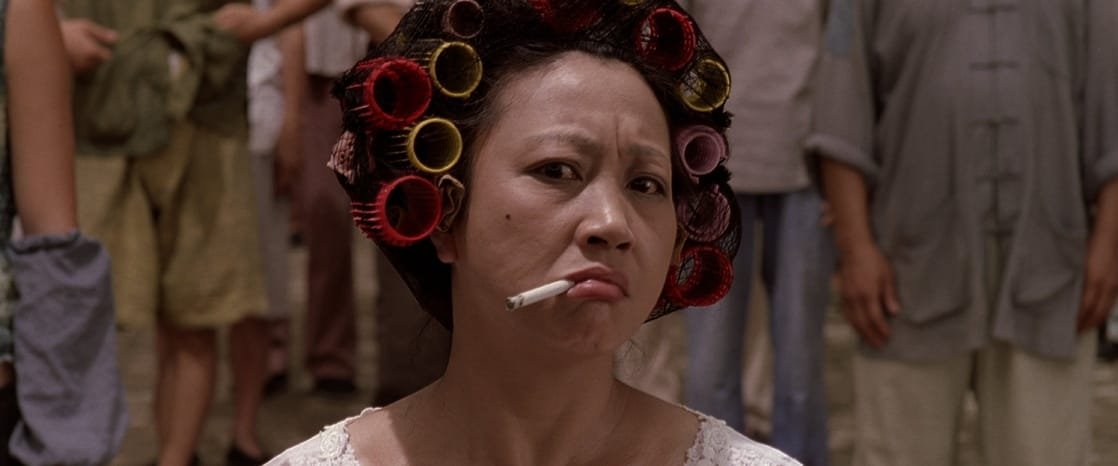Raise The Red Lantern (1991)
A game of patriarchy and foot massages.
Presentation:
The film is beautifully shot highlighting Chinese architecture by framing everything like a symmetrical painting. The interesting angles and presentation allow us to more clearly visualize the relationship between the husband and his wives (concubines). The film explores Chinese patriarchy through the power a rich man holds over women in 1920s China. Some audiences of the west may assume the story is metaphorical, but this manipulation is identical to the textbook male dominated society in China. If you think you understand that depths of patriarchy that are often carelessly referenced in 2020s, think again. This is what patriarchy actually looks like and is still alive and well in China today. This makes it one of Zhang Yimou’s more relevant and profound films, which will undoubtedly be overshadowed by his beautiful epics like Hero, I don’t believe have the impact of this one.
Story:
The film takes place in 1920s China under a system where men may have more than one bride, called mistresses or concubines. Songlian is the main character and youngest as well as prettiest, meaning she will have privileges given to her by the husband, including what food to eat. It's a toxic dynamic, where the other wives fight, manipulate and sabotage each other in order to gain the Master's affection and benefits that come along with it, which is symbolized by the raising of lanterns and foot massages. To explain a bit of context, back then in 1920, China was severely uneducated. Going to college was considered an extreme luxury especially for a woman, whom normally would just get married and wouldn't need to work. Women don't carry the family name and are basically tools to enrich the family. They receive little to no financial resources, which are given to the son instead, which is why bearing a son is so important in Chinese culture. What this film nails is the two faced nature of women. It is usually those that are most kind and closest to you that are the most wicked. So although the third wife is the primary enemy of Songlian, they develop an understanding and hatred toward the second wife, the most vile snake. But the film doesn't do a great job of giving redeeming qualties to any of the wives to make you care for their outcome. The second wife had what was coming to her, but I am not satisfied with Songlian's arc. Given she is young and naive, she is educated and I assumed she would have a master plan up her sleeve but it just turns out she is even dumber than the countryside wives. And why does she have such a moral burden? The maiden also totally deserved what she got, she didn't have to stand there refusing to apologize. In spite of what? To go crazy is simply a metaphor for how Chinese girls feel, but storywise I think it feels out of place. I also don't see how the Master, no matter how rich could get away with such a crime, but we can look past this as realism is less relevant for a social commentary film.
Analysis:
In Chinese society, money is king. Probably moreso that intelligence, handsomeness, love, without money you have nothing. If you try to explain the term gold digger to a Chinese, they wouldn't think it's bad, that just normal. So through money, you can achieve godly status and all the wives you want. Of course the youngest wife will receive the most attention, but quarrels between concubines would happen in similar fashion. In a monogomous culture in China today, men will still cheat on their wives. Although it is not as explicit, among men it will be a sign of pride to flaunt wealth and mistresses. The wives would of course be mad, but in reality often look the other way if the husband is rich enough. This a sad reality where woman are essentially seen as baby making tools to marry off and enrich family wealth. Having sons is also a real priority, where even if you are wealthy, countryside villages will laugh at you as your bloodline is cut off. It's all very contradictory and paradoxical, but this culture is so engrained that although there is strong rejection to some of these ideas for among the younger generation, it seems insurmountable to make progress. It could be argued in the film that the wives are not perfect either. Why get married and willingly enter this patriarchical system if you know this is the result? To be honest, I didn't feel much sympathy for anyone. All the wives are victims, but the film failed to demonstrate the invisible shackles that force woman to abide with regretful complicity.
Conclusion:
This is quite an important film that should be viewed by feminists and anyone that thinks they understand patriarchy. The events and toxic scheming that unfold may seem shocking to western audience, but will probably feel commonplace for Chinese girls. But it’s beautifully shot and presented in a way the western audiences can still digest even if they don’t know anything about Chinese culture. It resembles the greatness of a political dramas like Game of Thrones, but in a Chinese setting wth less competence. One of Zhang Yimou’s best films.
Sort by
- action 80
- adventure 52
- animation 28
- biographical 39
- chinese 14
- comedy 56
- coming of age 21
- crime 84
- culinary 8
- detective 17
- documentary 7
- drama 250
- driving 7
- experimental 17
- fantasy 49
- french 10
- german 3
- heist 9
- historical 26
- horror 66
- japanese 10
- korean 11
- lgb 3
- music 17
- mystery 79
- norwegian 1
- psychological 34
- romance 48
- russian 1
- satire 16
- sci-fi 56
- spanish 6
- sports 7
- superhero 9
- suspense 23
- swedish 1
- thai 1
- thriller 137
- war 21
- western 10
- zombie 5
- 🌶 3
- 🌶🌶 31
- 🌶🌶🌶 144
- 🌶🌶🌶🌶 205
- 🌶🌶🌶🌶🌶 61




































Hollywood film noir doesn’t seem that high up anymore.